There have been few quarterbacks to come out of college since the year 2000 who are as electric and polarizing as Heisman trophy-winning quarterback Lamar Jackson. Jackson's draft stock has risen into the first round as of late, but the off-season hasn’t been a slam dunk for him. The myriad question marks surrounding the QB culminated with Hall of Fame GM Bill Polian claiming that Jackson would be better suited to play receiver.
Lamar Jackson had a rough outing at the 2018 scouting combine. This included an NFL GM saying that he’s still a “project at the whiteboard”, to sub-par reviews at his throwing session, all culminating in a putrid 49 MPH throwing velocity from the throwing workout. These results could spell disaster for the projected first-round QB, considering that a throwing velocity of 49 miles per hour was recognized as a “death knell” statistic in my QB success and failure model last year which can be seen here.
I couldn’t believe the velocity measurement since I know Lamar has a much stronger arm than the likes of Nathan Peterman. An article last year showed that Deshaun Watson had a much stronger arm than was demonstrated at the Combine. I’m going to be doing the same exercise, but for Lamar Jackson. My results show that Lamar Jackson has what it takes to play QB in the NFL with an arm that often generate passes that exceed 60 miles per hour.
Featured Promo: Get any full-season NFL Premium Pass for 50% off and win big in 2022. Exclusive access to our Premium articles, 15 lineup tools, new Team Sync platform, Lineup Optimizer, Premium DFS tools and cheat sheets, and much more! Sign Up Now!
Electrifying Upside, Frightening Offseason
I watched three games, along with a highlight video to get a grip on Jackson’s arm talent. I watched the first, middle, and last games of the season to see if there was a noticeable difference in his velocity, and there was not. Each throw was hand-timed (timed at least three times, then the average was calculated and used as the data point), then timed frame by frame in a 60 frame per second app. To get an understanding of functional velocity vs. possible velocity I tracked velocity at the completion of the pass and a partial distance of the pass.
Here are the results:
| Pass order:
A is hand timed, B is FPS timed |
Full Distance | Partial Distance |
| 1a vs. Purdue | 45.92 MPH | 56.71 MPH |
| 1b vs. Purdue | 55.16 MPH | 58.44 MPH |
| 2a vs. Purdue | 49.96 MPH | 60.13 MPH |
| 2b vs. Purdue | 47.72 MPH | 59.48 MPH |
| 3a vs. Purdue | 52.01 MPH | 58.78 MPH |
| 3b vs. Purdue | 54.2 MPH | 64.11 MPH |
| 4a vs. Florida State | 31.86 MPH | 55.99 MPH |
| 4b vs. Florida State | 28.19 MPH | 58.44 MPH |
| 5a vs. Mississippi State | 34.42 MPH | 52.9 MPH |
| 5b vs. Mississippi State | 32.4 MPH | 51.14 MPH |
| 6a vs. NC State | 54.38 MPH | 74.38 MPH |
| 6b vs. NC State | 51.63 MPH | 66.7 MPH |
Each of these passes were traveling far faster than Lamar’s recorded 49 miles per hour fast ball. Though, this graph provides little context the rest of this article will give you what you need to see for yourself that Lamar will be just fine.
Speed Passes
Each of the details of each pass will be laid out here, you may notice that some of the distances are different, this is because upon closer inspection at the frame by frame level, the distances of the start and end points became different.
We also have to take into consideration that the cameras will never be at a perfect angle to see exactly when a ball passes a certain point, thus this will likely provide a bit of error in the calculations. More importantly, very few passes are in a perfectly straight line, thus all calculations in this article are likely to be slower than reality, because a diagonal line is inherently longer than a straight line when travelling to the same endpoint.
Purdue 2017, https://www.youtube.com/watch?v=1PwJY4Cu4yw
1a. Hand Timed @2:43 in the video.
At 49 yard to the 27 .98 seconds 22 yards. 45.92MPH
Same pass, at 49 yard line to 33.3 yard line. 15.66 yards .565 seconds 56.71 MPH
1b. FPS Timed.
At the 49 to the 25 2:43:58 to 2:44:47 .89 seconds 24 yards. 55.16 MPH
At the 49 to the 35. 2:43:58 to 2:44:07 .49 seconds. 14 yards 58.44MPH
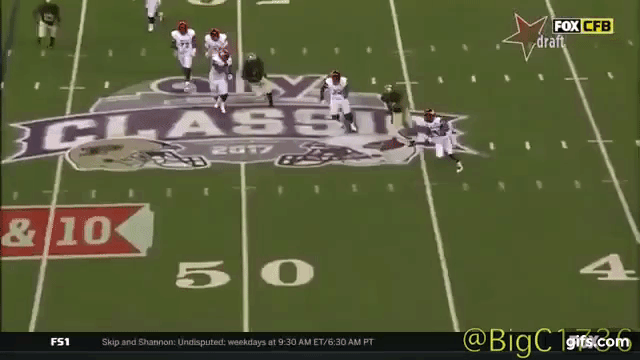
He is on the run to his left during this pass. This is a near straight line pass, so the calculations made here will be a better depiction of his actual throwing speed than some we’ll see where he’s throwing across the field. Jackson throws a bit high on the pass, but it is completed more than 20 yards downfield.
2a Hand Timed. @7:51 in the video.
At the 22 to the 50. 1.16 seconds 28 yards 49.96 MPH
At the 22 to the 34.8 12.8 yards combined times: 60.13 MPH
2b. FPS Timed.
At the 22 to the 50. 7:55:81 to 7:57:01. 1.2 seconds. 28 yards. 47.72 MPH
At the 22 to the 34.8. 7:55:81 to 7:56:25. .44 seconds. 12.8 yards. 59.48 MPH
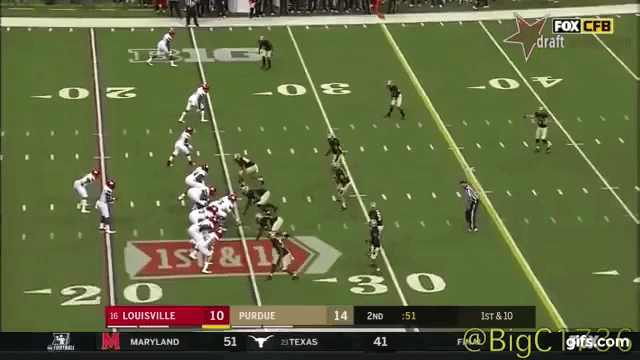
In this play, Jackson avoids multiple defenders, maneuvers in the pocket, identifies his receiver more than 25 yards down the field, and hits him in stride. This play is risky, but Jackson hits his receiver where even if the receiver can’t make a play on the ball, he’s still in position to break up the interception. This is the kind of tight window pass that Jackson will have to make at the next level if he is to be successful.
3a. Hand Timed: @8:22 in the video.
At the 45 to the 14. 1.2183 seconds (average) 31 yards. 52.01 MPH
At the 45 to the 35. .348 seconds. 10 yards. 58.78 MPH
3b. FPS Timed
At the 45.5 to the 14.5. 8:24:98 to 8:26:14. 1.17 seconds. 31 yards. 54.2 MPH
At the 45.5 to the 35. 8:24:97 to 8:25:305. .335 seconds. 10.5 yards. 64.11 MPH
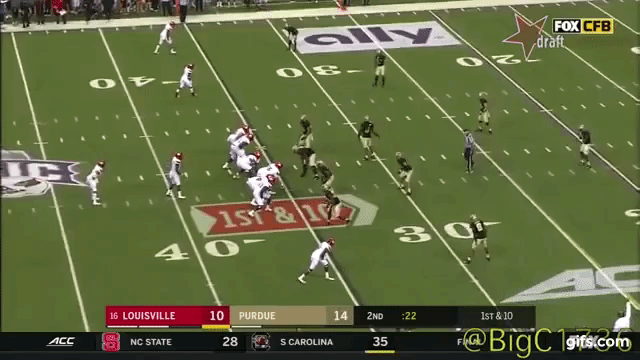
Another example of Jackson’s wizardry. Jackson avoids a penetrating rush and has a chance to navigate to the right side of the field where he launches a rocket to a place where only his receiver can get it. This is a phenomenal example of NFL level arm talent and ball placement.
Louisville vs. Florida State: https://www.youtube.com/watch?v=C_g64bV3ed4
4a. Hand Timed. @8:34 in the video.
At the 35 to the goal line. 2.2467 seconds. 35 yards. 31.86 MPH average.
At the 35 to the 29. .2192 seconds. 6 yards. 55.99 MPH
4b. FPS Timed.
At the 35 to the goal line. 8:36:49 to 8:38:92. 2.54 seconds. 35 yards. 28.19 MPH average.
At the 35 to the 29. 8: 36:49 to 8:36:70. .21 seconds. 6 yards. 58.44MPH
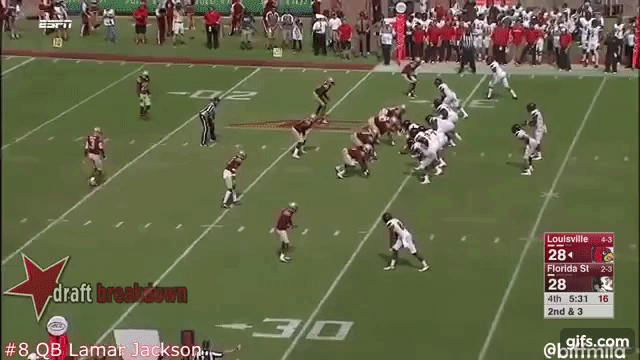
Jackson, for once has a clean pocket to work from. He steps into his throw and widens his base a bit more than he’s often criticized for. This leads to a perfect touch pass dropping right into the arms of the receiver in the end zone. Only the receiver could make a play on this ball, and of course, he drops it. This pass is even more impressive because it’s going across the field. Jackson must have superior arm talent to be able to make this play and it shows with a velocity of 58.44 MPH six yards out from the launch point.
Louisvilee vs. Mississippi State 2017 https://www.youtube.com/watch?v=HsfTUdHsN74
5a. Hand Timed. @7:07 in the video.
At the 28 to the 2. 1.545 seconds. 26 yards. 34.42 MPH
At the 28 to the 18. .3867 seconds. 10 yards. 52.9 MPH
5b. FPS Timed.
At the 28 to the 2. 7:11:06 to 7:12:70. 1.64 seconds. 26 yards. 32.4 MPH
At the 28 to the 20. 7:11:06 to 7:11:38. .32 seconds. 8 yards. 51.14 MPH
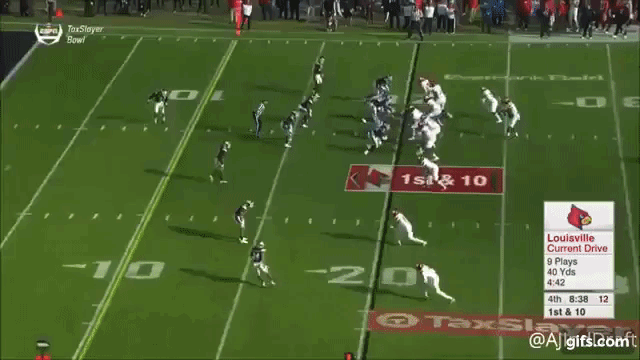
Jackson demonstrates his poise in the pocket during this play. Near the redzone, the Cardinals are hoping to take a shot and send five receivers out after the ball is snapped. The interior defender breaks the line and is coming in hot. Jackson takes the hit and sends a 50+MPH fast ball near the right pylon. Although this is not 100% accurate, it is a catchable ball. Furthermore, the ball trajectory is at a wide angle, making the pass even more difficult. There are a lot of passes like this in Jackson’s tape, he’s poised in the pocket takes a hit, and does what’s necessary for his players to make plays, but time after time, they let him down.
Highlight video, top ten throws. https://www.youtube.com/watch?v=dQiqX00kBnI
6a. Hand Timed: @2:29 in the video.
At the 23 to 3.5 yards into the end zone. .9967 seconds. 26 yards. 54.38 MPH.
At the 23 to the 15 .22 seconds. 8 yards. 74.38 MPH.
6b. FPS Timed:
22.5 to 3.5 into the end zone. 2:30:79 to 2:31:80. 1.03 seconds. 26 yards. 51.63 MPH
22.5 to the 15. 7.5 yards. 2:30:79 to 2:31:02. .23 seconds. 7.5 yards. 66.7 MPH.

This is by far the best demonstration of Jackson’s arm talent in my short tape review. Jackson is near the red zone and wants to throw a strike. He stands firm in the pocket as the edge defender is closing in on him. This is the widest we see Jackson’s base and it shows his real potential. Jackson rifles this ball to the receiver between two defenders in an incredibly small window. Seven and a half yards out, this ball has traveled an average of 66.7 MPH. No one should think that Jackson can’t make NFL throws after seeing this.
Conclusion
Although it is foolhardy to think that we can see everything Jackson is from three games and a highlight reel, we see everything we need to know that Jackson has at least the requisite skill set to play in the NFL, and to be a more than successful fantasy option. Jackson has the arm to be able to make nearly all NFL throws. Jackson is flexible and slippery in the pocket with more than enough poise to recognize downfield receivers and hit them when opportunities are presented. Jackson seems to recognize the crucial impact that waiting a fraction of a second in the pocket has. If he can refine his mechanics in his feet, and can learn to slide while running, Jackson can be a top ten NFL QB for many years to come.
More NFL Draft Analysis
 RADIO
RADIO






















